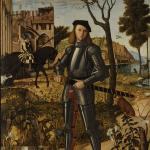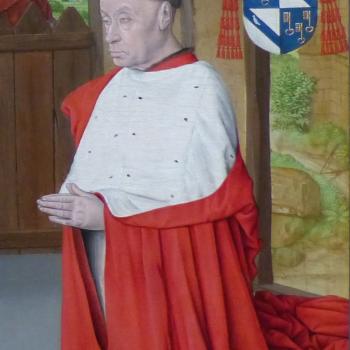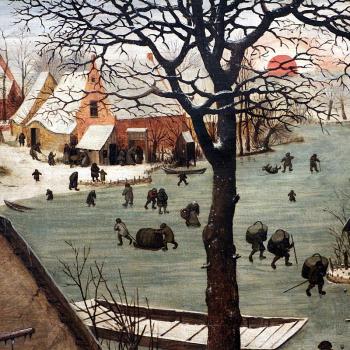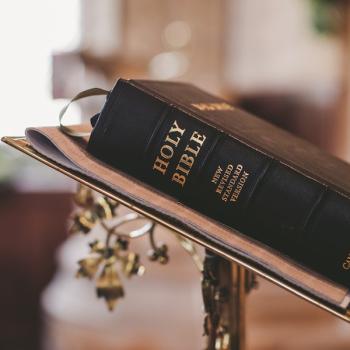As for the excommunication itself, it is a remarkable document. First of all, Humbert takes pains to distance Cerularius and his associates from the rest of Constantinople, and especially from the Emperor. His is by no means an excommunication of the entire Eastern Church, or even of the entire Church of Constantinople. In fact, as earlier stated, Humbert indicates that his inspection of the Church and people of Constantinople had discovered “great good” (Humbert Exc.) in them, and found them “most Christian and Orthodox” (Ibid.).
However, as for “Michael, wrongfully called Patriarch, and the partisans of his stupidity” (Humbert Exc.), Humbert is not so positive. Rather, these are guilty of an entire list of theological charges, each one designed to link them directly to a past form of heresy. “Just like Valesians they castrate their guests” (Ibid), and “just like Arians they rebaptize Latins baptized in the name of the Holy Trinity” (Ibid); and so on and so forth. The charges show a haphazard mentality. Some of them, like the charge of defending married priests, would doubtless be true of all Eastern Christians; others, such as believing fermented bread was alive, were obviously not true even of Cerularius and his associates. Most inaccurate of all would be Humbert’s charge that Cerularius and his associates had, “like the Theomachian heretics” (Humbert Exc.), actually deleted the words “and the son,” or filioque, from the Nicene Creed. As a matter of a fact, it was the Western Church that had added these words, as Popes and Western bishops had been aware for hundreds of years; and the controversy occasioned by this addition, under the name filioque, is generally considered the most significant issue leading to the Great Schism. Yet, in fact, this is the first time the filioque appears in this controversy, brought up not by the Eastern Christians, but by Humbert and his fellow Westerners.
The most significant charges, though, seem to be those concerning Cerularius’ attacks on the Western Church and the Papacy. As in Pope Leo’s letter, the title of Ecumenical Patriarch is singled out as an indication of pride and an assault on Papal authority. Likewise, Cerularius is accused of refusing to receive into communion those following the Western custom of shaving their beards, and also of having Western Christians rebaptized. The reason for these actions, Humbert argues, is Cerularius’ heretical belief that “except for the Church of the Greeks, the Church of Christ and the true sacrifice and baptism have perished from the whole world” (Humbert Exc.). Because of these heresies, Cerularius closed the Western Churches and persecuted the Western Christians in Constantinople; and by doing this, he “in her children has anathematized the Apostolic See” (Humbert Exc.), Rome. In the view of a Western Christian, excommunicating the Roman Church was equivalent to excommunicating oneself. Furthermore, Humbert argues, Cerularius then “denied his presence and conversation” (Ibid) to the Roman legates, refusing to answer the charges against him. Because of this, and because Cerularius refused to listen to Pope Leo’s admonitions, Humbert now “subscribes to that which our Lord Pope Leo has written” (Ibid) and delivers the formula of excommunication: “Let Michael the abusive neophyte Patriarch […]; and with him Leo called Bishop of Ohrid; and Michael’s sacrilegious accomplice Constantine […]; and all their followers in the aforementioned errors and presumptions; let them be Anathema Maranatha […] with all heretics, and with the Devil and his angels, unless perhaps they will repent” (Humbert Exc.).
This, then, is Cardinal Humbert’s account of the incident. Cerularius’ stated views are given principally in two documents: a decree of the Synod of Constantinople excommunicating the legates, and a letter written by him after the incident to his fellow Patriarch, Peter of Antioch. According to Michael, the incident began when, having heard of the noble character of Pope Leo, he decided to write to him to discuss “the scandals, subject of common talk, having to do with” (Cer. Petr.) the Western Christians. He then entrusted these letters to an Imperial official, who was tasked with carrying letters from the Emperor to the Pope. At some point after sending these letters, however, Michael claims he was visited by the Archbishop of Trani, a Bishop from the Byzantine areas of Italy According to Michael, the Archbishop revealed to him a remarkable conspiracy against him being played out in Italy. Apparently, the Imperial official bearing Cerularius’ letters had been coopted by one Arguros, the Byzantine Duke of Southern Italy and a political enemy of Cerularius. Arguros, a Latin Christian, had previously disputed with Cerularius about the use of unleavened bread, and as a result had been “not even once only, but even twice and thrice and four times” (Caer. Petr. VII) excommunicated by him. Having persuaded the Imperial official to deliver Cerularius’ and the Pope’s letters to him, Arguros had then summoned together some of his closest allies for a secret meeting. Perhaps through the Archbishop of Trani, Cerularius was supposedly able to learn some fragmentary details about this meeting and who was present at it, information which pointed directly to the three members of the supposed Roman delegation to Constantinople: Humbert, the Archbishop of Amalfi, and the deacon Frederick. According to Michael, however, this delegation was not, in fact, from Rome at all, nor was Frederick actually a Chancellor of the Roman Church. Rather, Arguros and his cronies had merely feigned their Roman positions and commission, “so that he might be able to rule in fraud through this, as through some seemingly irresistible wall” (Caer. Petr. V). These miscreants had then taken the Pope’s letters intended for Cerularius and deliberately altered them, adding arguments taken directly from Arguros’ past disputes with Cerularius. Armed with this fraudulent mission and with fraudulent documents, they had then set out for Constantinople.












